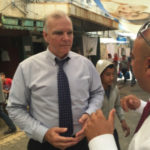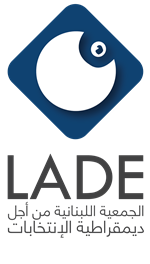
Credit: NDI
Hezbollah and its allies have won a small majority of seats in Lebanon’s first parliamentary election in nearly a decade, boosting its influence and giving its patron Iran greater sway over the country, the Wall Street Journal reports:
Prime Minister Saad Hariri’s Future Movement party, backed by Saudi Arabia and Western countries, had the biggest losses. But despite the setback, Mr. Hariri still has the largest bloc of Sunni Muslim seats, making him a front-runner to again lead the government in Lebanon’s complicated political system. Hezbollah won 13 seats, unchanged from the number it won in the previous election in 2009, according to the Interior Ministry. Along with its allies and current coalition partners, however, Hezbollah’s coalition now holds 71 seats out of 128, up from 57 in 2009.
Lebanon’s unique sectarian make up and place in the region make its politics about local issues like jobs, infrastructure and garbage collection as well as about regional rivalries and alliances. In general, the country’s politics have long broken down between a camp affiliated with Iran and one oriented toward Saudi Arabia and the United States, the New York Times adds:
 Mr. Hariri, the leader of the latter camp, appears to have lost ground because his supporters were disappointed by his performance and because of the concessions he had to make to rival parties to secure his post as prime minister, said Emile Hokayem, an analyst at the International Institute for Strategic Studies, who was in Lebanon for the vote.
Mr. Hariri, the leader of the latter camp, appears to have lost ground because his supporters were disappointed by his performance and because of the concessions he had to make to rival parties to secure his post as prime minister, said Emile Hokayem, an analyst at the International Institute for Strategic Studies, who was in Lebanon for the vote.
The elections showed that Hezbollah’s sway depends on adapting to changing political circumstances, writes Michael Young, the editor of Diwan. But to assume that “Hezbollah = Lebanon,” means deleting that large proportion of Lebanese, very likely a majority, who simply reject the party’s agenda, he writes for the Carnegie Middle East Center:
That this should be done in the shadow of an election that affirmed Lebanon’s diversity and showed that Hezbollah can, at best, rely solidly on about a third of parliamentarians merits consideration. There will be no sudden victories against Hezbollah, but nor is Lebanon a branch of the party as some people continue to insist. Whether now or in the future, Hezbollah’s greatest enemy will remain the Lebanese state, and what the elections showed is that Hezbollah, paradoxically, knows it has to be a part of that state to better escape it.
 The victory of Hezbollah’s allies will only slightly strengthen the movement and should not be interpreted as a decisive victory, said Prof. Eyal Zisser, a vice rector of Tel Aviv University and an expert on Syria and Lebanon:
The victory of Hezbollah’s allies will only slightly strengthen the movement and should not be interpreted as a decisive victory, said Prof. Eyal Zisser, a vice rector of Tel Aviv University and an expert on Syria and Lebanon:
Hezbollah itself has barely increased its representation in parliament, because of the sectarian electoral system. Shi’ite parties can only get 27 seats in the 128-member legislature. And Hezbollah campaigns as part of a coalition alongside the Shi’ite Amal party and President Michel Aoun’s Free Patriotic Movement… He dismissed the notion that Hezbollah “won” the election, arguing that the reality is far more complex. Even Amal, Hezbollah’s ally, opposes the rising strength of Hassan Nasrallah’s armed movement.
“Hezbollah will continue to behave as if there is no Lebanese state or government, as if it is an independent entity,” Zisser told the Jerusalem Post.
 Despite pre-poll hopes that a civil society movement could break through into Lebanese politics, only one candidate was thought to have been elected, the Guardian adds:
Despite pre-poll hopes that a civil society movement could break through into Lebanese politics, only one candidate was thought to have been elected, the Guardian adds:
A feminist candidate, Joumana Haddad, was contesting the result that saw her narrowly lose out on becoming a second voice in a grassroots movement that had planned to challenge a political class dominated by former civil war figures and their scions.
Civil society activists in Beirut seized on the opportunity to field their own slate of candidates, known as Kulna Watani, or We Are All the Nation, the LA Times reports:
But without the resources of the more established parties to buy television airtime and blanket neighborhoods with posters, they struggled to make themselves heard. Their only seat went to a well-known journalist and television host, Paula Yacoubian.
Election monitors from the Washington-based National Democratic Institute – a core institute of the National Endowment for Democracy – said that they recorded inconsistencies but that polling officials and security forces had done their jobs with “admirable professionalism, compassion and pride,” The Washington Post reports.
Low voter turnout was the focus of the Washington-based National Democratic Institute’s election observation released Monday, a day after Lebanon’s first elections in nearly a decade. The statement noted a number of problems with the electoral process, The Daily Star adds. Nicole Rowsell, a senior adviser at the NDI, said that expectations for voter turnout had been quite high among political stakeholders due to the length of time that had passed since the last parliamentary elections, the introduction of out-of-country voting, and the high number of first-time voters.
 Les Campbell (left), part of the mission’s leadership, said the NDI’s 31 observers had been split into 15 groups, The Daily Star adds:
Les Campbell (left), part of the mission’s leadership, said the NDI’s 31 observers had been split into 15 groups, The Daily Star adds:
The teams were deployed to all electoral districts. While the NDI mission was unable to observe as many polling stations as the EOM, Campbell said there was close coordination with the EU team to ensure they could work as efficiently as possible.
 “They were told to spend at least a half-hour at each site,” Campbell said. “The idea was not to get quantity but quality.”
“They were told to spend at least a half-hour at each site,” Campbell said. “The idea was not to get quantity but quality.”
On the other hand, the Lebanese Association for Democratic Elections (right) reported over 7,000 polling violations in Sunday’s elections that saw fights break out in and around polling stations across the country. At least three candidates accused other parties of intimidation prior to and during the election.







